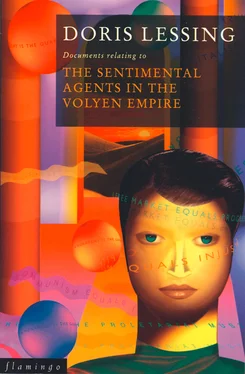It can be considered a rule that the probable duration of an Empire may be prognosticated by the degree to which its rulers believe in their own propaganda.
What riches we found in that, Johor!
Well, the complacent rulers of Volyen certainly believed in the image they projected. They saw themselves as kindly, parentally concerned instructors, bringing civilization to the backward populations they were engaged in enslaving and despoiling. And this made them blind to the real feelings that were boiling up under their so tender rule.
I remember how various stages of the Sirian Empire were used as illustration. In the earliest stage of all, they plundered and stole, murdered and destroyed, and this was done in the name only of the good of the Sirian Mother Planet. No pretence about it! (In the very earliest days of Canopus, we too took what we wanted, and blundered, and wondered why it was everything we touched went wrong and at length failed and collapsed, until we discovered the Necessity and were able to do what we should.) But as Sirius developed, not having found the Necessity, that Empire developed Rhetoric. Each new planet, each attractive new morsel of property, was swallowed to the accompaniment of words, words, words, describing theft as a gift, destruction as development, murder as public hygiene. The patterns of words, ideas, changed as Sirius grew a conscience and agonized through its long ages of change, expanding, then contracting, maintaining a sort of stability; then expanding or contracting again, always, always justifying what they did with new patterns of words. These word patterns never were anything like this: We are taking this planet because we need its wealth of minerals or soil, or labour. No, one way or another the conquest was always described in terms of the benefit to the planet itself.
The lying Rhetoric of invaders can therefore from one point of view, be looked upon as a tribute to morality …
I remember that I used Puttiora and its pirate subsidiary, Shammat, as an illustration of the opposite, a frankness about motive that was even attractive compared with this:
The people of (let’s say) Volyenadna, having voluntarily and enthusiastically agreed to our instructing them in the superior ways of our civilization, basely and treacherously rose against us, and had to be taught a salutary lesson by our heroic soldiers.
Shammat’s style is, always has been, more this:
Those dirty rats the Volyenadnans saw us loading up our cargo ships with their new harvest and they tried to set fire to it and murdered our men. So we taught them a jolly good lesson, and they won’t do that again.
The Volyen cities you described were full of new dignified, imposing public buildings, new prosperous suburbs, newly built forms of public transport, bridges, canals, places of amusement – were full of a self-confidence and vitality, all based on this view of Volyen at that time as ‘the greatest in the Galaxy,’ and this consciousness of possession and dominance was shared even by the poorest female labourer, then likely to die a third of the way through her normal life span because of hard work and overuse as a breeder. A loud, bustling, crude vitality; and, for the most part, these cities were inhabited by people of Volyen stock, amalgams of the original stock, which had bred with Volyenadnans, Volyendestans, the peoples of PE 70 and 71 (Maken and Slovin), to make up ‘We Volyens.’
What I saw when I went out from the tall room where Incent lay recuperating was, at first sight, not very different from your picture. The great public buildings of Volyen’s proud ‘Empire’ are still there, though shabbied by time. The parks and gardens are generously everywhere, but if you look close the trees are mostly old, and neglect shows in eroding earth and in the dirty waters of lakes and ponds. The prosperous suburbs are now parts of the inner city, for Vatun has spread out and abroad into new, smaller suburbs and meaner dwellings; and the dwellings of the inner city no longer hold single families with complements of servants, but several families each. The factories and workshops of Volyen’s greatness decline, and many stand empty. The general mood is not of unthinking and loud confidence, but, rather, of a puzzled and even querulous uncertainty. And everywhere you see how the Volyens who not so long ago held most positions of public importance are not replaced, often, by the citizens of their subject colonies; and this goes from some of the most prominent to the shopkeepers in the large and the little streets: trade was the motive power of Volyen at its peak, and now it is, increasingly, Volyenadnans and Volyendestans who own shops and organize trade.
As the ‘Empire’ grew uncertain, and resistance by the subject planets made ruling difficult and in some places impossible; as conditions worsened in the subject planets – so large numbers of their population came ‘home’ to Volyen to share in the wealth that had been plundered from them. As you walk through the streets and parks and squares of Vatun, you see as many aliens as you see Volyens. And perhaps that is the most immediately striking difference that you would see, Johor. As for the other differences, the primary ones, they are less easily described.
To say: This is an Empire in collapse – that is easy, and we have seen it all a thousand times before. To say: As an Empire collapses, those people who have been displaced and deprived tend to be sucked into the centre – nothing new about that. But each collapsing Empire has its own ‘feel,’ its atmosphere, which cannot be conveyed simply by talking of an uncertainty of will.
And in this case, of course, it is an Empire that will shortly fall apart as it is taken over by Sirius in a phase of its own implosion – and this brings me to the next and perhaps most important part of this, my Report to you.
As a consequence of a long contact with us, our slow education of Ambien II, the Sirian Empire developed a crisis of self-examination and questioning about its role, its motives, its function: it trembled on the edge of the real question, the only question: What are we for? The Sirian Empire, in one of its stages of contraction, so that its physical size was a fraction of what it had been at its height, was riven into two main factions, one supporting Ambien II in exile and the other Four who had followed her there. (That ex-ruling junta, the Five, have been in exile not far from here, on their Planet 13, for two S-years, fifty V-years.) This faction demanded an approach to us, to Canopus, with a request for an education in fundamentals, an understanding of the Necessity. Meanwhile, a decision to inquire into the possibilities of acquiring Virtue (their name for it) led to a premature conviction that they were already in possession of the real qualities. This faction, during the (brief) period it was on top, enthusiastically expanded, overrunning not only planets Sirius had previously colonized and abandoned, but planets previously not colonized because they were not thought to be of enough value. But in this new mood of ‘Virtue,’ in which they saw themselves as the bringers of benefits, even second-class and third-class planets have been forced to become reluctant members of the Sirian Empire.
While Sirius has been seeing itself as the bringer of new benefits, because of its new description of itself, its victims have been unable to distinguish between this fresh expansion of Empire and previous expansions, for all have been accompanied by torrents of self-lauding words, and in fact there has been no difference at all in practice. You will already have noted, of course, that this faction on Sirius illustrates the law to which you drew our attention: A governing class that are victims of their own Rhetoric are not likely to survive for long. The faction opposed to the exiled and imprisoned Five, whose ideas exerted powerful influence even though they, the Five, were unable to see any channels of communication whatever, were not able to combat these ideas, and from one end of the Empire to the other, everyone was chanting slogans about Necessity, and Virtue. But it soon became evident to nearly everyone that nothing had changed: the Empire was in a phase of expansion, and planets were falling victim to savage exploitation, as usual to the accompaniment of Rhetoric. The opponents of the Five, who had been conferring without cease as to the choice of the right words with which to discredit the Five, found that the Five were discredited by life itself, for talking about Virtue had not changed anything. The Five, together again in exile on their Planet 13, understood that they, again and for the thousandth time, had been deceived by their own verbal formulations. This time, however, there was a new influence, namely ours on Ambien II, and this did not cease because we were not in actual physical communication. The Five in their enforced isolation and contemplation of events, came to understand that by being responsible for the use of words that distorted and perverted what Canopus stands for, they had been responsible, because of their misguided and premature advocacy of Canopus, for the discrediting of Canopus; but that this fact did not, could not, change the nature of Canopus and what Canopus could offer. The Five learned to hold fast to the truth that when Sirius was up to it, Canopus was there, would remain ready to instruct. And the Five left it at that, refusing to issue new manifestoes, proclamations, theses, analyses of the situation, which they were always being pressured to do because every kind of clandestine messenger and envoy kept arriving on their planet from dissident groups everywhere in their Empire, and of course there were – and are – plentiful spies as well from the Opposition, mostly wanting to get formulations that can be used for their own purposes, and of course wanting too the benefit of the Five’s many thousands of years of experience. There are also historians, archivists, recorders, and Memories of every sort. So the isolation of the Five is relative.
Читать дальше












